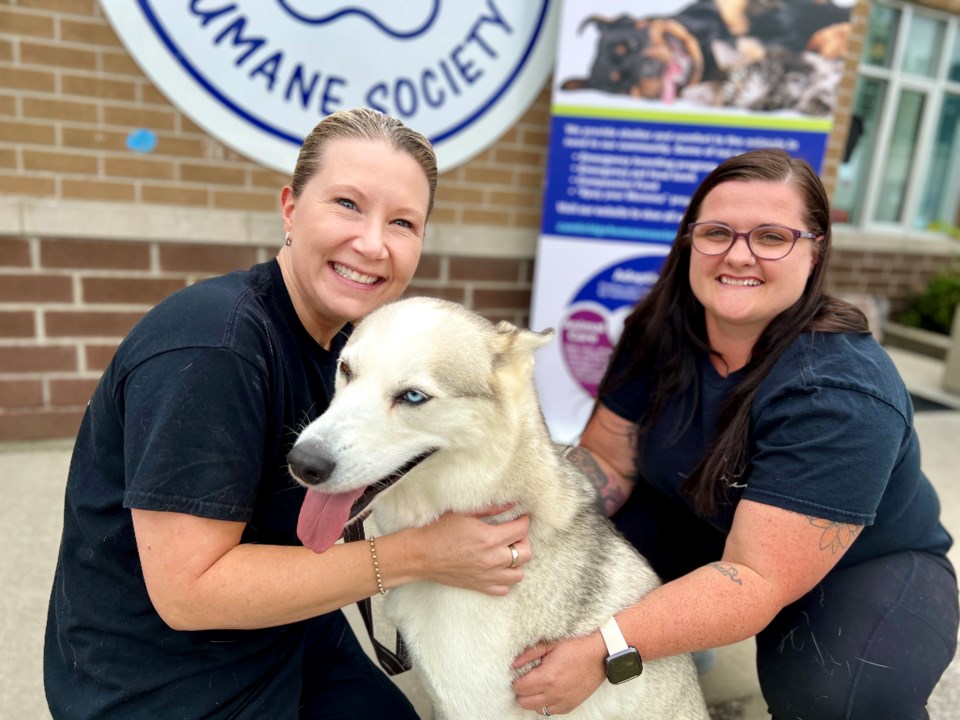The Cambridge and District Humane Society is offering pet owners a convenient and cost-effective opportunity to reduce the risks of rabies and to increase the chances of happy reunions for lost pets.
The society is hosting a rabies vaccination and microchip clinic on Aug. 26 to encourage pet owners to vaccinate their dogs and cats against rabies and to microchip their pets to prevent animals from becoming anonymous strays.
The event, to be held at the society’s 1650 Dunbar Rd. clinic from 10 a.m. to 2 p.m., is the first rabies vaccination clinic organized by the society.
While pet owners are legally required to vaccinate their pets against rabies, there are more frightening concerns than facing a fine. The rabies virus is almost always considered fatal to animals, and while the risk may be low, the risks remain real thanks to rabies cases in wildlife.
“We have had an animal in here that we were not allowed to handle unless we were fully gloved and gowned,” explained humane society animal supervisor Michelle DaSilva.
According to the province’s rabies education website, pets can get rabies if bitten by a rabid animal, or if they get saliva, brain or spinal tissue from an infected animal in an open wound, in the eyes, mouth or nose.
According to public health Ontario, in 2020, rabies cases were confirmed in 39 bats, seven skunks and three raccoons. There hasn’t been a confirmed case of rabies in humans in the province since 1967.
It’s hoped the clinic will provide a convenient way for people to safeguard their dogs and cats – as some may not have their own veterinarian – but also offer a chance to do it cheaper. A rabies shot is $30 and a microchip is $25 – or $50 for both.
“It's cost effective,” DaSilva said. “Very cost effective.”
This isn’t the first time the shelter has hosted a microchipping event and it certainly won’t be the last, as it’s too important a tool in preventing homeless animals.
Microchips, tiny devices implanted under the skin, are programmed with the pet’s name and the owner’s contact information.
“Microchipping is amazing,” said DaSilva. “It just allows us to reunite pets with their owners a lot faster, or not even have them enter the shelter system at all.”
The clinic will also serve as a vital fundraiser for the society, grappling with the pressures of a spike in homeless pets and an increase in the cost of care. It’s not usual for a dog to wait eight months to be adopted, a wait that is both expensive for the shelter and stressful for the animal.
“We are nice and full with dogs right now, and adoptions are low so funding is needed to help sustain everything that we do within the building,” DaSilva said.
One factor driving that dilemma is a delayed effect of the pandemic; a time when people paid premiums for dogs and opportunities for training and socialization were limited, often resulting in behavioural issues.
“We’re kind of in the heart of it now,” DaSilva said. “What we were looking at in the past couple of years in comparison to now, I would say that we're feeling those effects.”
As of Aug. 2, eight dogs were awaiting adoption. And the job of finding homes never ends.
On the previous Friday, there were cheers at the shelter after a dog was finally adopted after a seven-month stay, but four more dogs arrived on the shelter’s doorstep the same day.
“You celebrate and then it’s like here we go again,” said adoptions counsellor Darline Leslie.
Despite experiencing its own financial struggles, the society lowered fees to get pets into homes and minimize costs of care.
“That impacts our bottom line because the expenses are always there,” said executive director Michelle Gellatly, appealing for support to ensure care for animals remains the top priority.
Supporters can give via the CanadaHelps online donation site, or even fulfill the shelter’s Amazon wish list.
The Aug. 26 clinic, which will only serve dogs and cats over four months of age, is offered by appointment only, with advanced payment via e-transfer, over the phone using Visa or Mastercard, or via cash, or via debit or credit in-person at the shelter.
Appointments can be booked by calling 519-623-7722, extension 225.
The clinic will also see a social gathering element, featuring vendors Heaton Up the Grill food truck, Pet Valu Hespeler Road, Rens, Pet, Nail Trims with Krystal from New Approach Canine, as well as games and prizes.



.png;w=120;h=80;mode=crop)